MASLD vs MetALD With Janet Gripshover
Chat with MASLD AI

Hi, I am MASLD AI.
Suggested Questions :

MASLD AI 03:58 AM

Janet Gripshover, NP, explains how to spot and manage metabolic dysfunction–associated steatotic liver disease (MASLD) and MASH—now the preferred terms replacing NAFLD. Through a real patient case, she shows how ultrasound findings, everyday risk factors (PCOS, high blood pressure, cholesterol, higher BMI), and an honest alcohol history point the way. Janet covers easy, non-invasive tests (FIB-4 blood test, FibroScan® stiffness and CAP scores) and when alcohol biomarkers (PEth, urine EtG) help confirm what’s really driving the liver damage. You’ll learn simple next steps: Mediterranean-style eating, resistance exercise, weight loss goals, and complete alcohol cessation to prevent progression to cirrhosis. She also notes when to start liver cancer (HCC) screening and what to document in the chart. Perfect for APPs and clinicians looking for a clear, practical MASLD/MASH workflow.
Related Podcast

Monitoring for MASLD in Type 2 Diabetes

In this episode, Kelly Smeester, PA-C from South Denver Gastroenterology, explores the critical intersection of type 2 diabetes and metabolic dysfunction-associated steatotic liver disease (MASLD). Drawing from her background in both hepatology and endocrinology, Kelly offers practical, evidence-based strategies for non-invasive monitoring of liver fibrosis in patients with diabetes who may initially appear low risk. She highlights the utility of tools like FIB-4, ELF score, FibroScan, and MR elastography, while emphasizing the limitations of relying solely on liver function tests (LFTs). Kelly recommends annual FIB-4 screening—easily calculated with existing lab values—and discusses when to escalate to more advanced diagnostics. She also shares how advanced practice providers (APPs) can seamlessly integrate MASH education, lifestyle counseling, and routine screening into the diabetes care workflow, supporting early intervention and long-term liver health. This episode is a must-listen for clinicians looking to optimize care for patients at risk of silent liver disease progression in the setting of metabolic co-morbidities.
Watch Now
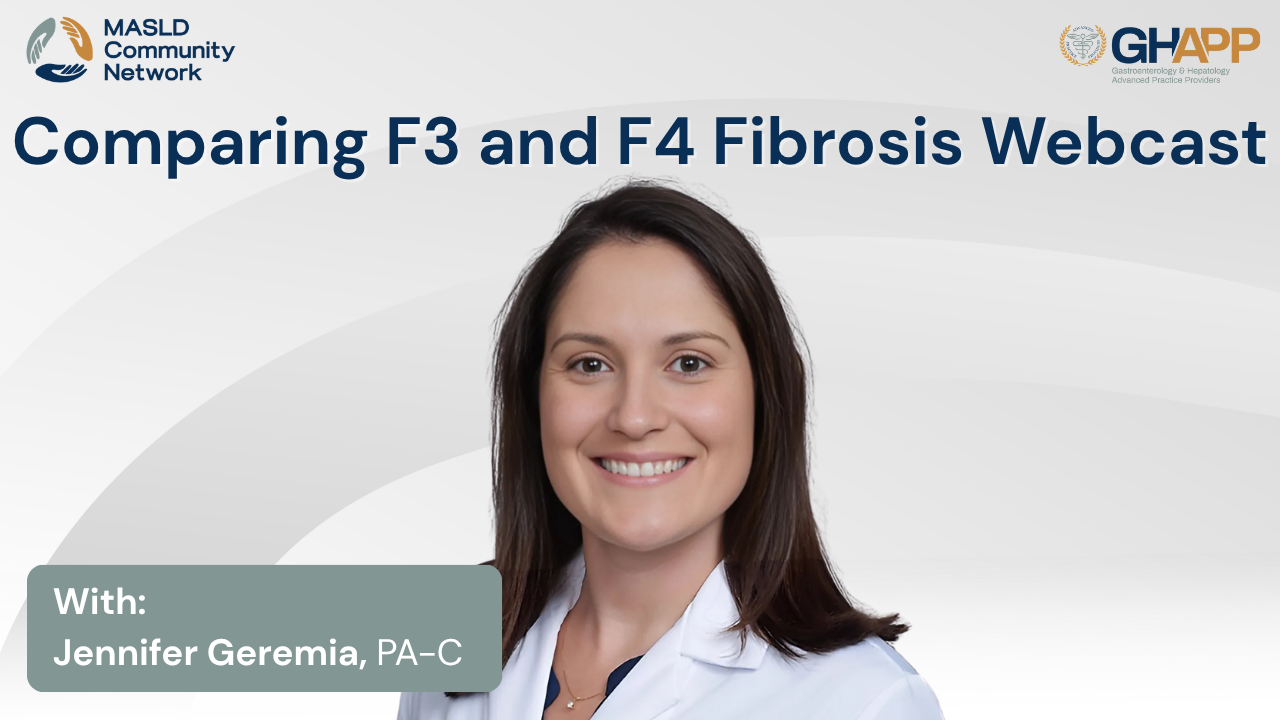
Comparing F3 and F4 Fibrosis With Jennifer Geremia

In this GHAPP MASLD Community Network session, Jennifer Geremia, PA-C from Boston, discusses the critical differences between F3 fibrosis and F4 cirrhosis in patients with MASLD (Metabolic Associated Steatotic Liver Disease) and MASH (Metabolic Associated Steatohepatitis). Using a detailed case study, she outlines how non-invasive tests (NITs) such as FIB-4, FibroScan, CAP score, and ELF testing can help differentiate fibrosis stages and guide patient management. The discussion highlights when to consider advanced testing, the role of resmetirom (Rezdiffra) in eligible F2–F3 patients, and why treatment strategies differ for those with F4 cirrhosis, including the need for HCC surveillance, portal hypertension evaluation, and variceal screening. Jennifer also emphasizes lifestyle modifications, metabolic risk factor control, and multidisciplinary care as essential components of managing advanced liver disease. This presentation provides valuable insights for GI, hepatology, and primary care providers navigating the nuances of fibrosis staging and treatment decisions in 2025.
Watch Now
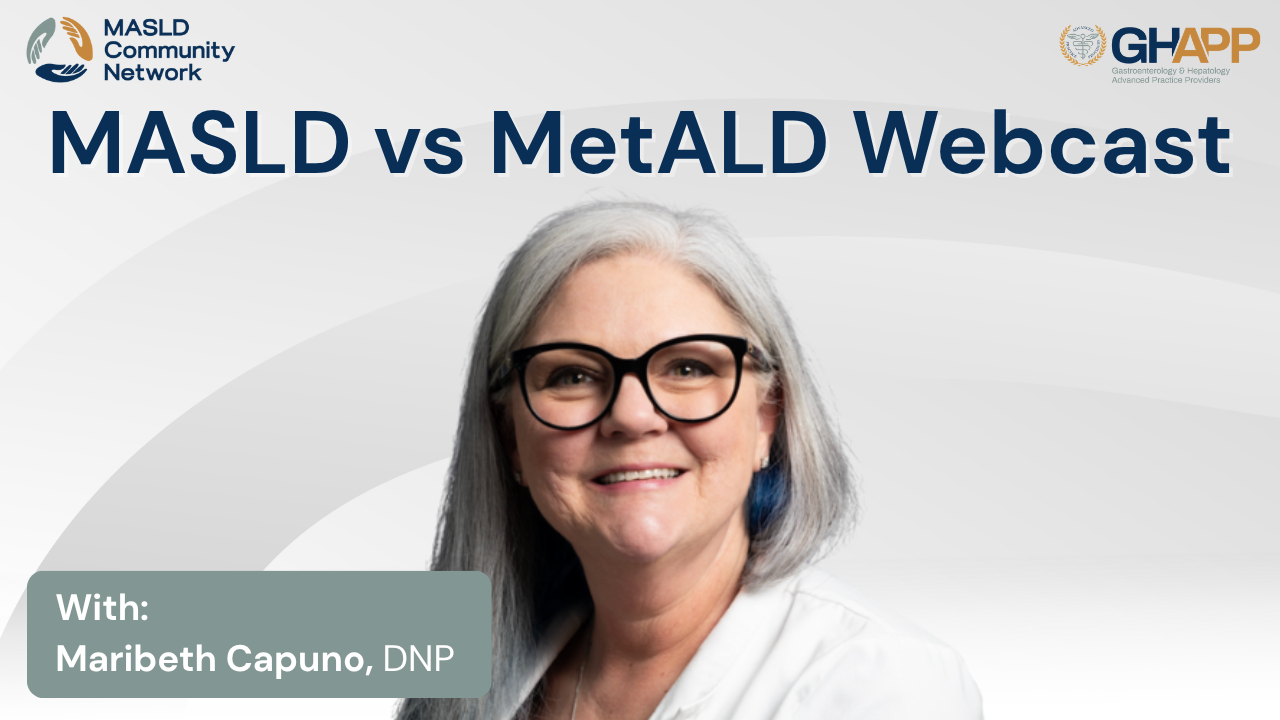
MASLD vs MetALD With Maribeth Capuno

In this case-based talk from the GHAPP MASLD Community Network, Maribeth Capuno, DNP reviews how to differentiate metabolic dysfunction–associated steatotic liver disease (MASLD) from metabolic dysfunction plus alcohol-associated liver disease (MetALD). Using a 52-year-old patient with ultrasound-confirmed steatosis, metabolic risks (PCOS, hypertension, hyperlipidemia, prediabetes), and daily wine intake, she walks through labs and noninvasive testing—FibroScan 11.4 kPa (F3 fibrosis) and CAP 310 (severe steatosis)—plus an objective PEth biomarker of 120 indicating moderate–heavy alcohol use. The session covers the SLD spectrum, “standard drink” counseling, why questionnaires (AUDIT) and biomarkers (PEth) uncover under-reported alcohol use, and how alcohol synergizes with insulin resistance and dyslipidemia to accelerate fibrosis and decompensation risk. Practical management includes Mediterranean-style nutrition, exercise with 5–10% weight-loss goals, strict alcohol cessation, medication considerations for advanced fibrosis, and HCC surveillance in F3 disease. Ideal for APPs and hepatology clinicians, this video delivers step-by-step evaluation, diagnostic criteria, and clear, patient-education talking points to improve MASLD/MetALD assessment and outcomes.
Watch Now

Beyond Basic NITs: When is Liver Biopsy or Advanced Imaging

In this episode, Brian Lam, PA, Associate Director of Research at Inova’s Liver and Obesity Research Program in Northern Virginia, explores the nuanced decision-making involved in going beyond basic non-invasive tests (NITs) for diagnosing and managing MASH (metabolic dysfunction-associated steatohepatitis). While FIB-4 and transient elastography are useful initial tools, Brian breaks down when and why clinicians should consider more advanced diagnostics—such as MR elastography (MRE), proton density fat fraction (PDFF), and in certain cases, liver biopsy. Learn how to assess the reliability of a TE exam, interpret discordant NITs, and when to escalate to cross-sectional imaging or histologic confirmation. This podcast also highlights the evolving role of fat fraction in therapy response, limitations in current FDA indications for resmetirom, and how emerging data may shape future clinical pathways for patients with compensated cirrhosis. Whether you're in primary care, GI, or hepatology, this discussion offers critical insights to improve accuracy in staging liver disease and optimizing treatment strategies for patients with MASH.
Watch Now
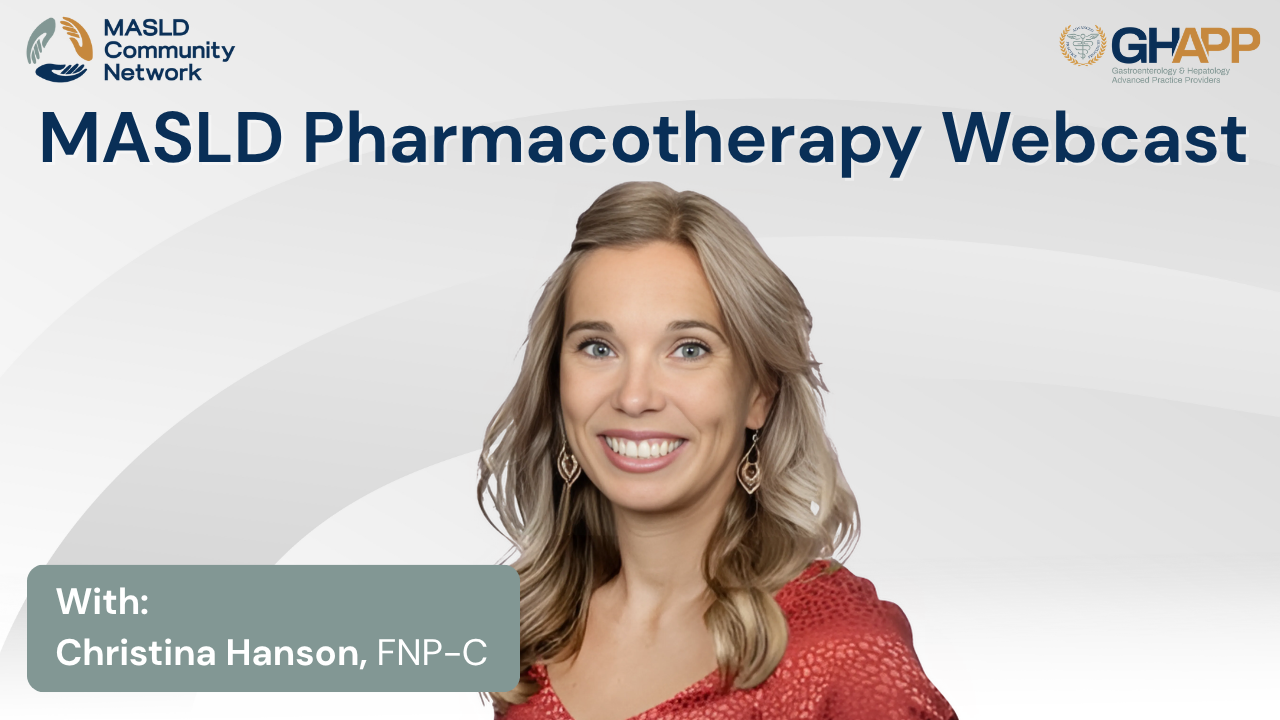
MASLD Pharmacotherapy With Christina Hanson

Learn about the latest advances in MASLD and MASH pharmacotherapy in this educational session from the GHAPP MASLD Community Network. Christina Hanson, NP, reviews the evolving landscape of treatment for metabolic dysfunction-associated steatotic liver disease (MASLD) and steatohepatitis (MASH), including the critical role of weight loss, cardiovascular risk reduction, and liver-directed therapies. The discussion covers current management strategies such as GLP-1 receptor agonists, bariatric interventions, statins, and lifestyle modification, while also exploring guideline-supported options like vitamin E and pioglitazone. Special attention is given to the first FDA-approved therapy for MASH, Resmetirom, including its mechanism, clinical trial results, safety considerations, and monitoring recommendations. Whether you are a hepatology specialist, primary care provider, endocrinologist, or advanced practice provider, this session highlights practical approaches to managing patients with MASLD and MASH and offers insights into emerging therapies that may shape future clinical practice.
Watch Now
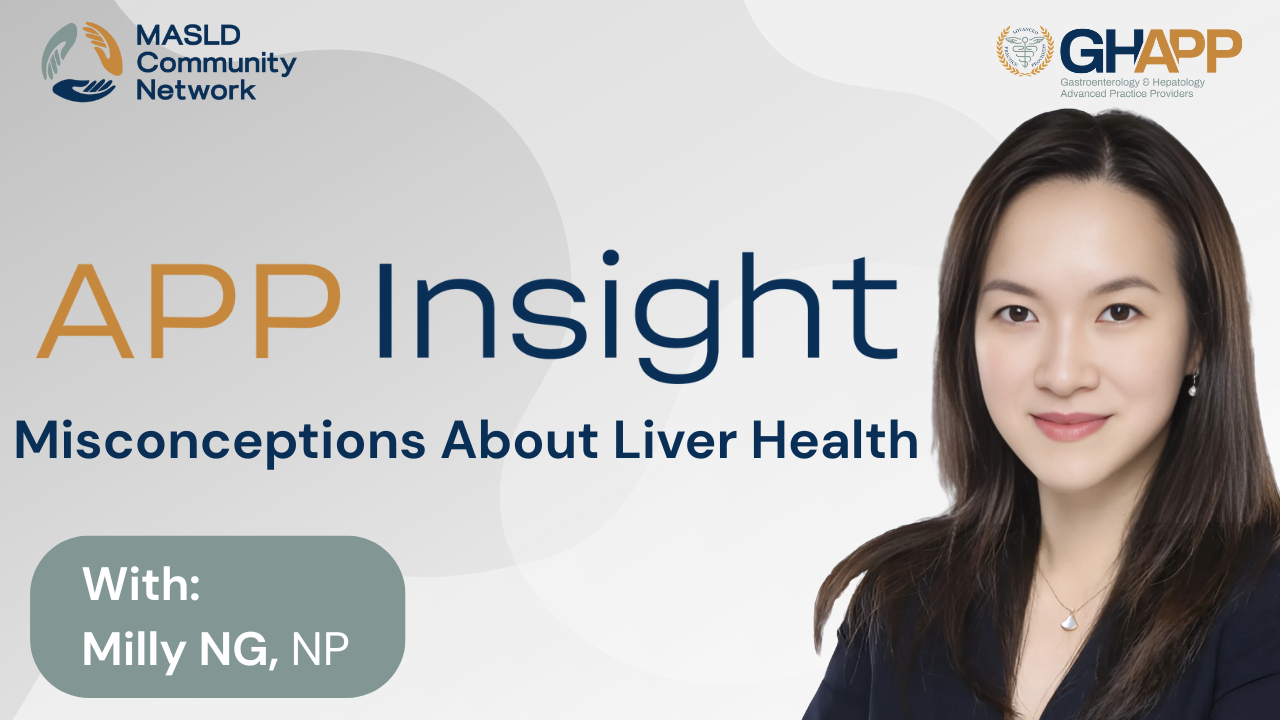
Misconceptions About Liver Health

In this short and informative video, Miu Lai Ng, a nurse practitioner at Tufts Medical Center, debunks two of the most common myths about liver health. First, she sets the record straight on liver cleanses and detox teas—explaining that your liver already detoxifies your body daily and doesn’t need fad diets or trendy supplements. Instead, what your liver needs is support through sustainable habits like reducing alcohol intake, cutting back on processed sugars, and maintaining a healthy weight. She also highlights a critical point: liver disease is often silent, and many people with significant liver damage have no symptoms until it’s advanced. If you're at risk due to metabolic syndrome, alcohol use, or other factors, Miu Lai urges you to talk to your healthcare provider about screening options like FIB-4 or FibroScan®. Your liver works hard for you—this video is a reminder to return the favor with real, lasting care.
Watch Now
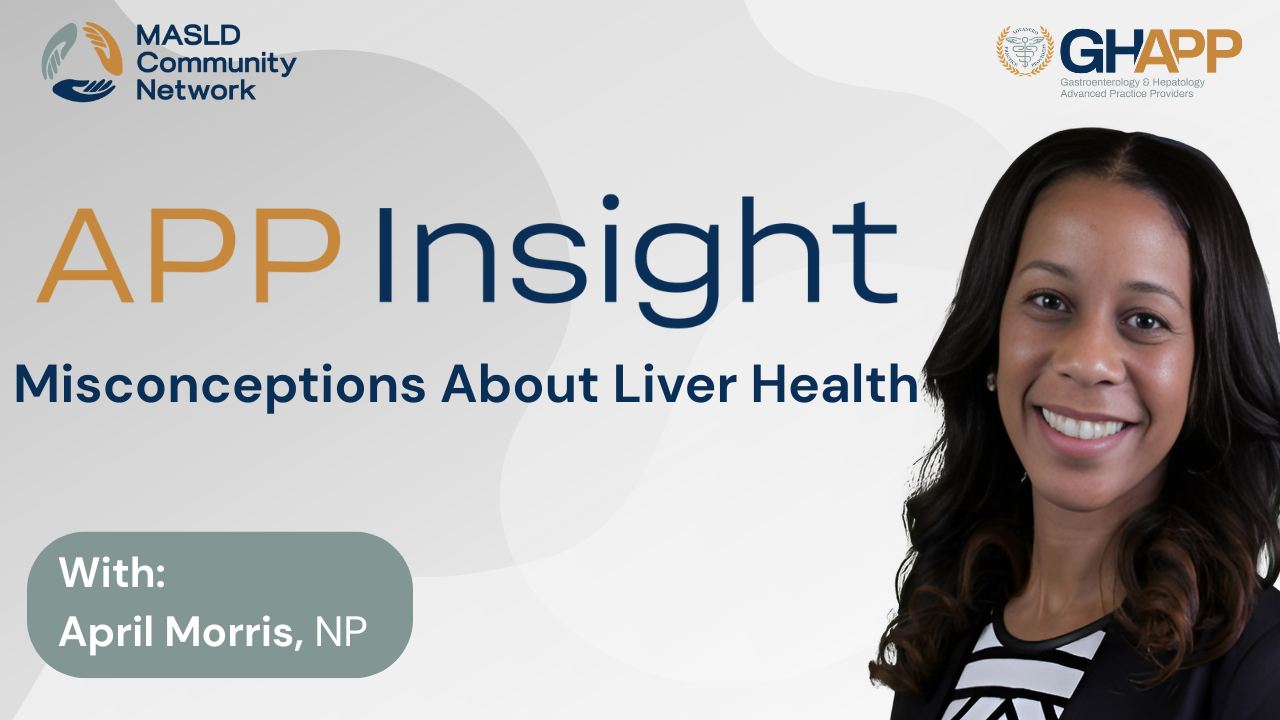
Misconceptions About Liver Health With April Morris

Liver health is often misunderstood, with many patients and even providers believing that elevated liver enzymes mean certain medications are unsafe. In this video, April Morris, a family nurse practitioner specializing in hepatology and endocrinology, clears up misconceptions about liver disease and medication safety. She explains why evaluating overall liver function—through markers like bilirubin, albumin, and platelet counts—is far more important than looking at liver enzymes alone. April also emphasizes that many commonly prescribed medications, including statins and metformin, are generally safe for patients with liver conditions when monitored properly. Beyond medications, she highlights the powerful role of lifestyle modifications—reducing alcohol intake, managing carbohydrates and sugar, focusing on healthy nutrition, and incorporating exercise. These changes, she explains, can dramatically improve outcomes for patients with fatty liver disease (MASLD/MASH), diabetes, and other metabolic conditions. April underscores that patients hold the power to protect their liver health, but education and awareness are essential since liver disease can often remain a “silent killer” until it’s too late. Watch now to gain expert insights on how to better understand liver labs, avoid common myths, and take proactive steps to support long-term liver function.
Watch Now

Podcast: Pharmacotherapy for MASH/MASLD: An Overview

In this comprehensive episode, Christina Hanson, FNP-C at South Denver GI, provides an in-depth overview of pharmacotherapy for MASLD and MASH, with a focus on the FDA-approved therapy resmetirom (brand name Rezdiffra). Drawing on over 18 years of experience in hepatology and GI care, Christina explains the histologic endpoints used in clinical trials—MASH resolution and fibrosis improvement without worsening disease—and how they guided the approval of resmetirom. She breaks down the drug’s mechanism of action as a selective thyroid hormone receptor beta (THR-β) agonist, which promotes lipid metabolism and reduces liver inflammation without systemic toxicity. Christina reviews key Phase 3 data from the MAESTRO-NASH trial, showing resmetirom’s significant impact on both MASH resolution and fibrosis regression across diverse patient populations. She also outlines criteria for appropriate patient selection (those with stage F2-F3 fibrosis), clinical monitoring strategies, and management of side effects like transient GI discomfort. Christina emphasizes the importance of baseline screening for liver disease, autoimmune conditions, thyroid function, and lipid levels before initiating therapy. She highlights best practices from the 2024 AASLD guidelines for ongoing monitoring and treatment response assessment, including ALT and liver stiffness thresholds that help determine whether to continue or discontinue therapy. This episode is a must-watch for hepatology clinicians looking to implement evidence-based, patient-centered strategies in the management of MASH.
Watch Now
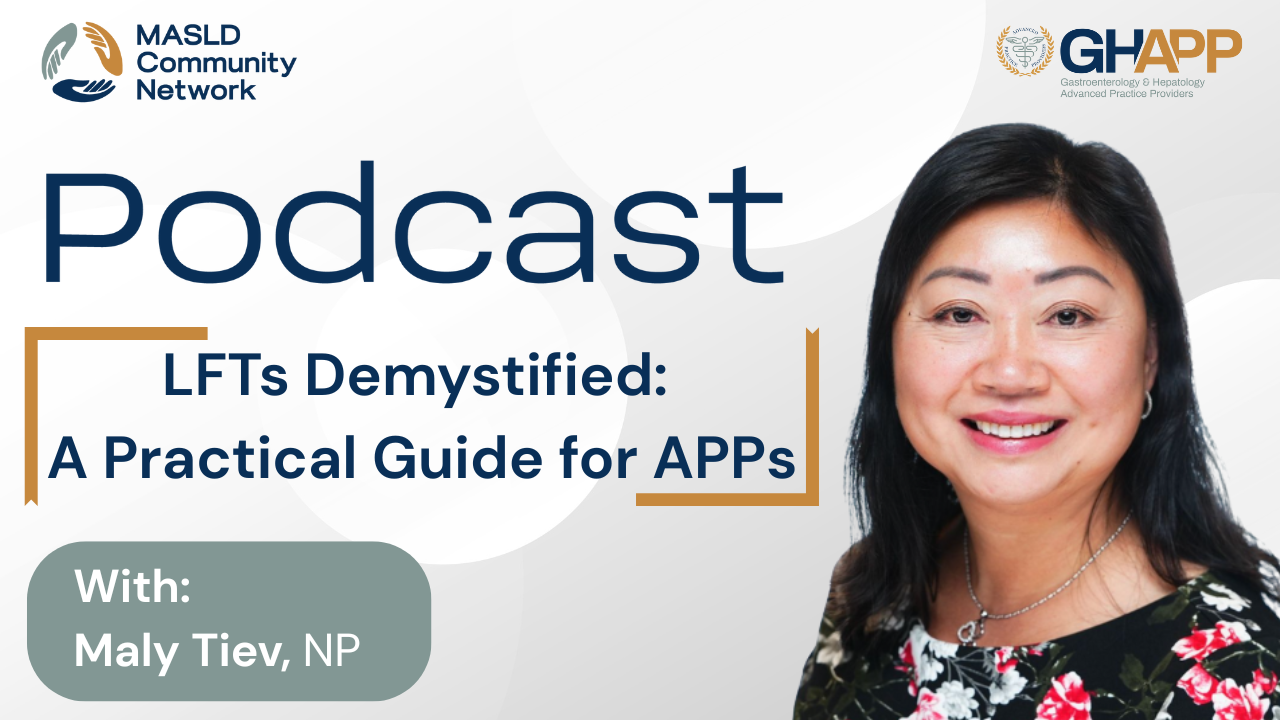
LFTs Demystified: A Practical Guide for APPs

Join Maly Tiev, NP at NYU Langone Health, for this essential educational session on demystifying liver function tests (LFTs), brought to you by the GHAPP MASLD Community Network. In this video, Maly explains how to interpret ALT, AST, alkaline phosphatase, GGT, bilirubin, albumin, INR, and platelet counts in the context of MASLD (Metabolic Dysfunction-Associated Steatotic Liver Disease) and MASH (Metabolic Steatohepatitis). Learn why elevated liver enzymes are not always present in MASH, how to distinguish between different causes of abnormal LFTs—including alcohol-related liver disease, viral hepatitis, and drug-induced liver injury—and how serial LFT monitoring can indicate treatment response or disease progression. Discover the importance of using non-invasive tools for fibrosis risk stratification, the role of platelets as a key marker, and how a deeper understanding of synthetic function tests can help identify cirrhosis earlier. Whether you're a clinician or a patient looking to understand the lab work behind fatty liver disease, this presentation offers practical insights for interpreting LFTs with confidence.
Watch Now
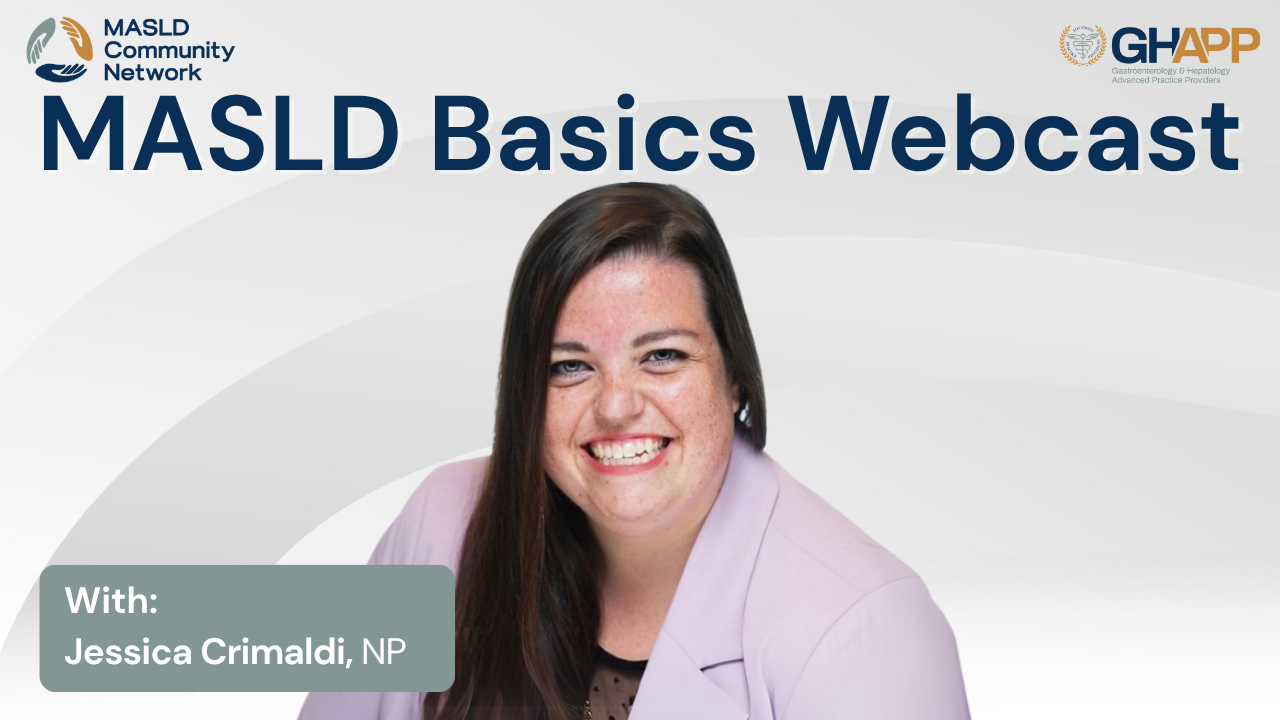
MASLD Basics With Jessica Crimaldi

Join Jessica Crimaldi, NP, from the Cleveland Clinic, for an in-depth and practical overview of MASLD (Metabolic Dysfunction-Associated Steatotic Liver Disease), presented through the GHAPP MASLD Community Network and supported by Madrigal Pharmaceuticals. In this foundational session, Jessica breaks down the new 2023 steatotic liver disease nomenclature, replacing NAFLD and NASH with MASLD and MASH, and explains how these changes align with updated AASLD guidelines. Through a case-based approach, she walks through key diagnostic criteria, highlighting the role of cardiometabolic risk factors, non-invasive assessments such as FIB-4, FibroScan, and ELF, and when to consider liver biopsy for staging fibrosis. Learn how to stratify patients based on metabolic profiles, evaluate imaging and lab results, and identify those at risk for progression to advanced fibrosis or cirrhosis. Jessica also discusses global epidemiology, genetics (like PNPLA3), environmental contributors, and the clinical importance of early detection. With a comprehensive workup strategy for primary care and GI settings, this session equips providers to implement guideline-driven MASLD evaluation and referral practices for improved patient outcomes.
Watch Now





 September 2025
September 2025 